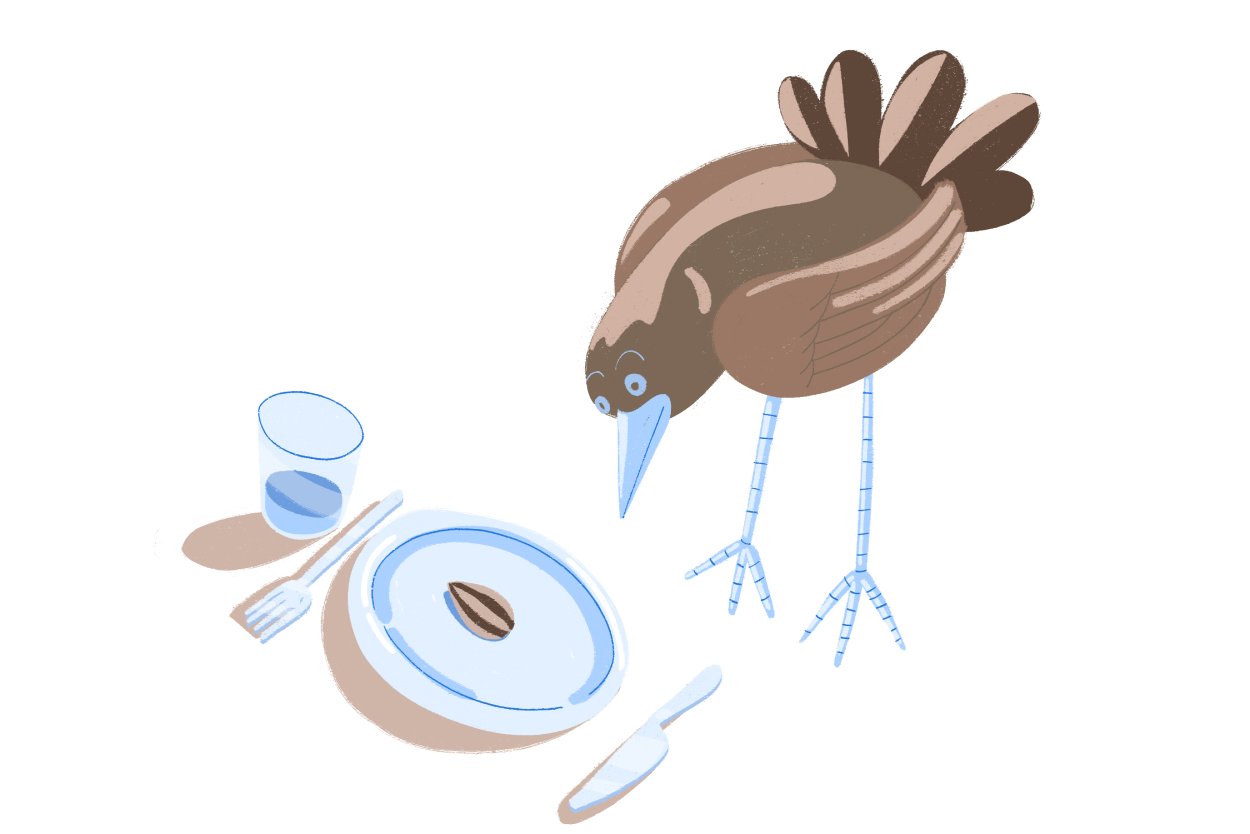More Than Human: Eben Kirksey and Multispecies Ethnography in the Era of COVID-19
• ‘Lipstick on a gorilla’. Illustration by Luca Romeo
Words by Melissa Howard
Illustrations by Luca Romeo
This story is brought to you by our partner, Deakin University.
When Matters Journal speaks to American anthropologist and author, Eben Kirksey, he has COVID-19 symptoms and is self-isolating in an RV on his parents 40-acre farm, an hour from Washington DC. Kirksey, best known for his work in multispecies ethnography, says, “It’s pretty mild. I’m not too worried about myself. I’m worried about the political and economic fallout.”
It is a fitting time to talk about multispecies ethnography, a more-than-human discourse that argues that all species – however small – have agency and import.
Multispecies ethnographers, says Kirksey, believe that other life forms – “the invertebrates, the microbes, the plants… are not simply the backdrop for the agency and action of animals and people.”
Indeed, the most influential life form on earth right now is a tiny, tiny virus (COVID-19 is so small it cannot be seen on a regular microscope). Kirksey says, “This seemingly imperceptible form of life – a virus – that, for most people, is totally beyond our consciousness, has suddenly forced the world to take notice.”
Multispecies ethnography falls between, or joins, two fields of thought. When Eben was an undergraduate student, there were two separate fields: “biology that studied nature and anthropology that studied culture,” he says. “There was no interesting middle space where I could bring nature and culture together.”
But, “multispecies ethnography is about studying the places where nature and culture meet,” says Kirksey. “In those spaces, what we’re looking at are consequential questions about who lives, and who dies in those spaces.”
“How are the lives of animals, plants and microbes making us who we are, enabling us to be in the world? And how are our political and economic, our cultural imaginaries, our dream worlds, impinging on lives all around us? Who gets to count as a form of life that is worthy of ethical regard, and who is disregarded in times of great environmental change, and existential peril?”
In 2010, Kirksey, and his co author, Stefan Helmreich, introduced the world to the term multispecies ethnography with a special edition of the journal, Cultural Anthropology. He has also written two books on the topic, Freedom in Entangled Worlds (2012) and Emergent Ecologies (2015). In 2014, he edited The Multispecies Salon (2014).
• ‘Bull in a china shop’. Illustration by Luca Romeo
Kirksey moved around a lot as a a child, which established his interest in anthropology. “There was always a new social or cultural situation.” From four to eight, he lived on a mountain in Tennessee. “I was given free rein to roam the woods and play in the creek and catch salamanders and crayfish, to go off with my dog, as long as I was back with sunset.”
So, he was always in the environment as a child?
Well, yes and no according to Kirksey, whose work aims “to explode the idea of ‘the environment’”. The term, ‘the environment' suggests that the backdrop to life is separate to life-forms, not an intrinsic part of it.
He uses the example of our own human bodies that are, themselves, ‘the environment’ for microbes. But, these microbes are also our support systems. When we eat, our body isn’t doing most of the work to break down our food. It’s bacteria and other organisms. “There is no clear distinction between the boundary of the human – our skin – and the worlds around us.”
We are, each of us, an ecosystem within an ecosystem – like endless Russian nesting dolls.
Kirksey refers to this dynamic as living in companionship. The mites that eat our dead eyebrow skin, are, like our cavoodles and cats, our companions. Living well, we live “in concert” with multispecies communities.
We are not, though, says Kirksey “all one”. We need boundaries. “We are now being shown, with a vengeance, that if you don’t [respect] boundaries, well, there’s consequences and those consequences can be deadly.”
Kirksey isn’t sure he believes that “the story will stick” that Covid-19 originated in wet-markets of Asia, telling me that evidence from SARS showed that animals, including pigs, were hosting a similar virus. And, in 2010, Celia Lowe tracked the H1n1 (‘bird flu’) virus and how economic and political systems created an environment that allowed the virus to jump to humans.
“My hunch,” Kirksey says, “[is that] because pigs are so widespread in the industrial economy right now, the pigs are also playing a role in the current moment.”
A study released in April, 2020, discovered that “virus transmission risk” from animals to humans is “highest from animal species that have increased in abundance and even expanded their range by adapting to human-dominated landscapes” – including widely farmed domesticated animals.
The way we are doing things – the industrial farming, fast-paced global movement, the decrease in biodiversity – is creating the spaces (or, lack of) where viruses can easily jump from animals to humans.
So, could we see COVID-19 as supporting an opportunity for reimagining a new way of seeing and doing things?
“It’s not only an opportunity, but it’s an actuality,” says Kirksey. “Something unimaginable has already happened. The velocity and speed that we’re all moving around…that’s all been brought to a halt.”
“Something unimaginable has already happened."
• ‘Eating like a bird’. Illustration by Luca Romeo
"We are in a moment of improvisation."
So, where can we go from here? How could multispecies ethnography influence our path forward?
This question, for Kirksey, produces more questions.
“How can we re-engage with life in a way that is more responsible? We’re learning how to do social distancing, but what new forms of intimacy can emerge from these moments? That’s the key question.”
“Planting seeds in soil and placing them on the window sill, finding a place in an abandoned lot nearby where you can nurture these plants and help them grow, and then they feed you and you feed them.”
“There are enormous opportunities for planting food in the ground, growing your own food, not depending on industrial assemblages like these agricultural plantation economies that are, in many cases, bad labour practises, toxic pesticides; that are dependent on moving vast quantities of things at a rapid pace all over the world.”
A Deakin academic, Kirksey is currently a member of the Institute for Advanced Study (IAS) in Princeton, New Jersey, for the year – but, due to corona, the Institude has gone online. (IAS, Oxford, Deakin, Yale – you’re an academic celebrity, I joke. “Not Yale,” he corrects, laughing, “Harvard.”) He’s due to come back to Australia and resume work at Deakin in June, but, obviously, all travel is suspended right now.
While he “hunkers down” in the trailer to wait out his corona symptoms, he is writing two new books – one is related to multispecies justice, and the other explores anarchism and mutual aid. He has also established the coronavirus multispecies reading group. His latest book, The Mutant Project: How the US and China are Racing to Create Genetically Modified Humans is out this year.
He is also focussing on his ‘pandemic project’ – building a tiny house; managing the farm’s 13 chickens and three goats; and learning how to forage for wild foods and farm organically. “It’s a new world. It’s a new life.”
Not just for him, for all of us.
“We are in a moment of improvisation. There’s a lot more learning we need to do before we can think of responsible ways of being together in the world.”






